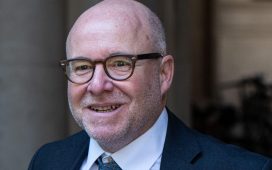Kemi Badenoch says Tories should view Reform UK voters as ‘our people’
In his interview with the BBC, John Major, the former Conservative PM, says that it would be a mistake for his party to chase Reform UK voters and move to the right as it works out how to respond to its election defeat. (See 9.26am.) But Kemi Badenoch, the leadership candidate most popular with party members according to most surveys, is saying exactly the opposite. In an interview with GB News she said that Reform UK supporters were “our people”.
She explained:
I think one of the mistakes we made was making Reform voters think that they were not our people. They are our people. Many of the people who voted Reform were lifelong Tory voters.
One of the moments that really created that impression was when we removed the whip from Lee Anderson. I think that was a mistake.
I told the chief whip, do not do this. This is a bad, bad decision.
That was a huge mistake and that lit the touchpaper. Basically we are saying ‘we don’t want these kind of people’, to get them out.
Anderson lost the Tory whip in February after making comments about Sadiq Khan, the mayor of London, that were widely regarded as Islamophobic.
But Major and Badenoch did agree (sort of) on not wanting Nigel Farage allowed to rejoin the party. (He was a member before he helped launch Ukip in the 1990s.)
Asked about Farage joining, Major said:
I don’t think he’s a Conservative, and he’s spent most of his time in the last few years telling people how much he dislikes the Conservative Party and would like to destroy it. I don’t think that’s a terribly good background for bringing someone into the party.
Badenoch was asked on GB News if she thought Farage was a Tory. She replied:
I think that he is a disruptor. But he has said that he wants to destroy the Conservative party, so I think that’s probably a no.
The “but” in that answer implies she sees being a disruptor as a bonus, not a handicap.

Key events
Superyacht and private jet tax could raise £2bn a year, say campaigners
Fair taxes on superyachts and private jets in the UK could have brought in £2bn last year to provide vital funds for communities suffering the worst effects of climate breakdown, environmental campaigners say. Sandra Laville has the story.
Kemi Badenoch says Tories should view Reform UK voters as ‘our people’
In his interview with the BBC, John Major, the former Conservative PM, says that it would be a mistake for his party to chase Reform UK voters and move to the right as it works out how to respond to its election defeat. (See 9.26am.) But Kemi Badenoch, the leadership candidate most popular with party members according to most surveys, is saying exactly the opposite. In an interview with GB News she said that Reform UK supporters were “our people”.
She explained:
I think one of the mistakes we made was making Reform voters think that they were not our people. They are our people. Many of the people who voted Reform were lifelong Tory voters.
One of the moments that really created that impression was when we removed the whip from Lee Anderson. I think that was a mistake.
I told the chief whip, do not do this. This is a bad, bad decision.
That was a huge mistake and that lit the touchpaper. Basically we are saying ‘we don’t want these kind of people’, to get them out.
Anderson lost the Tory whip in February after making comments about Sadiq Khan, the mayor of London, that were widely regarded as Islamophobic.
But Major and Badenoch did agree (sort of) on not wanting Nigel Farage allowed to rejoin the party. (He was a member before he helped launch Ukip in the 1990s.)
Asked about Farage joining, Major said:
I don’t think he’s a Conservative, and he’s spent most of his time in the last few years telling people how much he dislikes the Conservative Party and would like to destroy it. I don’t think that’s a terribly good background for bringing someone into the party.
Badenoch was asked on GB News if she thought Farage was a Tory. She replied:
I think that he is a disruptor. But he has said that he wants to destroy the Conservative party, so I think that’s probably a no.
The “but” in that answer implies she sees being a disruptor as a bonus, not a handicap.
‘Un-British, un-Christian, unconscionable’: Major condemns Tories’ Rwanda policy as he urges Tories not to lurch to right
Good morning. Judged by the amount of time he spent as prime minister, John Major was one of the most successful Conservative prime ministers of the post-war period. Only Margaret Thatcher and Harold Macmillan outlasted him in No 10. But he has not been aligned with mainstream thinking in his party since he resigned after losing the election in 1997, and in an interview being broadcast tonight he has unleashed a fresh attack on the policies of the party he used to lead. While his views are not 100% surprising to anyone who has been listening to him in recent years, they are a stark reminder of how much the political landscape has shifted in the last 30 years.
The interview, with Amol Rajan from the BBC, is being broadcast tonight. Here are the key lines.
I thought it was un-Conservative, un-British, if one dare say in a secular society, un-Christian, and unconscionable and I thought that this is really not the way to treat people.
We used to transport people, nearly three hundred years ago, from our country. Felons, who at least have had a trial, and been found guilty of something, albeit that the trial might have been cursory. I don’t think transportation, for that is what it is, is a policy suitable for the 21st century.
This does not just go further than anything anyone in frontline Tory politics would say now. Labour has abandoned the Rwanda policy, but people like Keir Starmer and Yvette Cooper always criticised it (at least in public) on the grounds of practicality, not morality. They said it would not work. They did not use terms like “un-British”, “un-Christian” and ‘“unconscionable” to describe it.
-
Major implied the last government deserved to lose the election. He said he did not give many interviews before the election because “there’s not been a great deal I could say, I would wish to say, in favour of what the previous government were doing.” And, talking about the election result, he said:
There’s a time of when democracy needs a change in government. I could see that in 1997, we had been in government for 18 years and it was perfectly true to say, that we were tired and that we were running out of fresh people to make ministers and reinject the government with vigour. And of course the same thing applies [with the recent election results], although it was only 14 years.
The only party that can legitimately appeal to the centre right is the Conservative party. And that is what we have to do, we have to decide where our natural support really lies and appeal to them. People may have made a misjudgement about the last election. We lost five votes to Reform UK and people are jumping up and down, and some, rather reckless people are saying, well we must merge with them.
Well, that will be fatal. We lost 50 to the Liberals, and we lost a huge amount to Labour. We lost the vote on the left, more than on the right. And we have to focus on that centre right position, and we’re not an ideological party, I do think traditionally we have been a commonsense party.
Major said he had not decided yet who to support in the Tory leadership contest. But the two favourites, Robert Jenrick and Kemi Badenoch, are both proposing to take the party to the right.
I’ve opened a blog with a politician from the past because the ones from the present aren’t making a lot of news this morning. But here is the agenda for the day.
10am: Prof Charlotte McArdle, the former chief nursing officer for Northern Ireland, gives evidence to the Covid inquiry in its module looking at the impact of the pandemic on healthcare. Prof Susan Hopkins, chief medical adviser at the UK Health Security Agency, gives evidence in the afternoon.
10.25am: John Swinney, the SNP leader and Scottish first minister, speaks at a rally in Edinburgh to mark the 10th anniversary of the Scottish independence referendum.
Noon: Wes Streeting, the health secretary, speaks at an event organised by the IPPR thinktank to mark the publication of its report on NHS reform. Lord Darzi, who wrote the report for the government published last week about the state of the NHS, is also speaking.
And David Lammy, the foreign secretary, is in Norway, meeting his Norwegian counterpart Espen Barth Eide.
If you want to contact me, please post a message below the line (BTL) or message me on social media. I can’t read all the messages BTL, but if you put “Andrew” in a message aimed at me, I am more likely to see it because I search for posts containing that word.
If you want to flag something up urgently, it is best to use social media. I’m still using X and I’ll see something addressed to @AndrewSparrow very quickly. I’m also trying Bluesky (@andrewsparrowgdn) and Threads (@andrewsparrowtheguardian).
I find it very helpful when readers point out mistakes, even minor typos (no error is too small to correct). And I find your questions very interesting too. I can’t promise to reply to them all, but I will try to reply to as many as I can, either BTL or sometimes in the blog.









